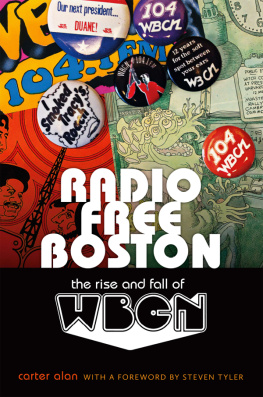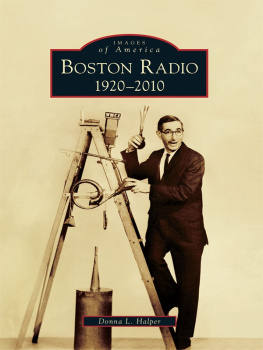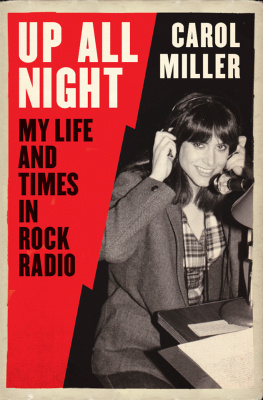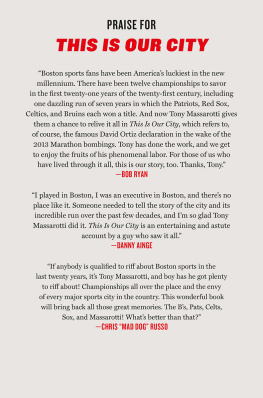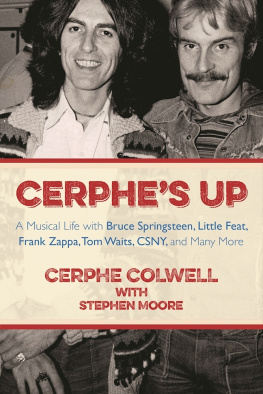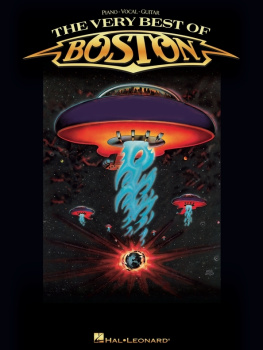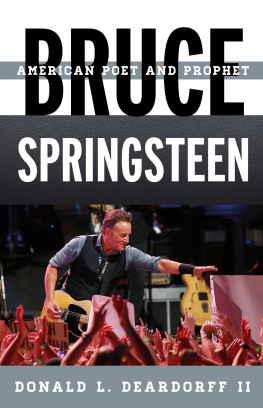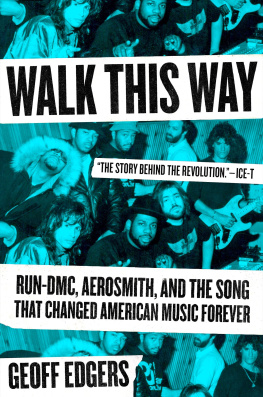
Northeastern University Press
An imprint of
University Press of New England
www.upne.com
2013 Carter Alan
All rights reserved.
For permission to reproduce any of the material in this book, contact Permissions, University Press of New England, One Court Street, Suite 250, Lebanon, NH 03766; or visit www.upne.com.
Library of Congress Cataloging-in-Publication Data
Alan, Carter.
Radio free Boston : the rise and fall of WBCN / Carter Alan ;
foreword by Steven Tyler.
pages cm.
ISBN 9781555537296 (pbk. : alk. paper) ISBN 9781555538262 (ebook)
1. WBCN (Radio station : Boston, Mass.)History. 2. Music radio stationsMassachusettsBostonHistory. I. Title.
PN1991.67. M86A43 2013
384.5453dc23 2013004735
FOR CARRIE
Contents
foreword
STEVEN TYLER
Imagine a time when you could get good in a band by practicing in a basement or garage, when you could play in local bars or clubs, and when local radio stations were actually running themselves. Real human personalities owned the music as much as the bands that wrote it; they frequented clubs, knew personally the pulse of local talent, and knew the goings-on of a community or city. This, in fact, is how everyone from Willy Dixon to Elvis, the Beatles, the Beastie Boys, Run DMC, and a little unknown band from Boston called Aerosmith got their foot in the door and proceeded to wreak havoc and bring the house down for the next forty years.
Its all Maxanne Sartori and WBCNS fault. We were ruffling our feathers one night when we caught her attention at a club called Pauls Mall. And before you knew it, I was sitting on her lap in the studio at 5:00 a.m. on a Sunday morning doing a cat-and-dog public service announcement. I tickled her fancy, so to speak, into playing Dream On and turning the daytime jocks on to our demos, which we had just recorded at Intermedia Studios on Newbury Street.
The timing was perfect, and the rest is history.
Due to the passion of these local DJS, we were able to ignite a fire that would burn in the hearts of millions...
THANK YOU WBCN,
Steven
preface
Just weeks after WBCN folded in August of 2009, I got a call from Stephen Hull from University Press of New England. Would I be interested in writing a book telling legends and fables from the birthplace of Boston progressive radio? My qualifications were that Id actually been employed as a DJ and music director at WBCN for a good chunk of its forty-one-year history (from 1979 to 1998) and that Id already published a couple of books. Although the idea intrigued me, the thought of militantly organizing my writing time around an already-bulging schedule at BCNS sister station WZLX did not intrigue me. I had jousted with that stress monster before, and as Confucius or maybe Charles Laquidara said, all work and no play leaves one a bundle of nerves and the master of nothing. So I stonewalled, fascinated by Hulls idea while equally fearing it, before declining. But Stephen refused to close the door and urged me to think about it.
Enter the wife here. Carrie also worked at WBCN, as a sales secretary from 1989 until 1995 (conveniently leaving the station moments after we tied the knot). She argued, You know most of the people that worked there; why shouldnt you write it? That was logical, but the issue remained that accepting the project would result in no life for an extended period of time, like when you were in fifth grade and all your friends ran past the house in a raging snowball fight, but your mom wouldnt let you suit up and join them until you finished that damn book report on Robinson Crusoe. Multiply that example into a year or two of abstention. Ouch!
Well, if you dont write it, someone else who didnt work there will do it... like that guy who wrote the Aerosmith book.
Stephen Davis, I replied. He also wrote Hammer of the Godsthe Led Zeppelin book, as well as one on Jim Morrison, Bob Marley, Guns and Roses...
Yeah, Stephen Davis will write it. Then what? Now, those are fighting words because Im a bit envious of Davis. Hes a damn good writer and, along with Cameron Crowe, seems to have had the greatest rock and roll journalism adventures on record. I mean, he knows the truth behind the Mudshark mythology! Button pushed, I replied, Yeah, why should he get the BCN story? I found myself shouting: He gets all the other stories! Ill do it!
A callback to Stephen Hull and my fate was set, for not one, or even two, but over three years. Writing in a limited time frame from five to eight every weekday morning with as much time as possible on the weekends, and recording and transcribing over one hundred interviews (104 to be exact, and no, I didnt try to do that), sent the project into serious overtime. I actually tried to bail at one point because my health started to go downhill, but Hull gave me slack and urged me to stay on it, albeit at a less frenetic pace. With apologies to Stephen Davis, I found myself becoming jealous of the fact that he could exclusively write for his supper and not need to divide his time between writing and work. It became a no-win every morning: if I was writing well, Id be upset that I had to put the computer away and do battle on the Mass Pike. If the writing resembled caveman gibberish, Id have no further time to wrestle the words into a decent representation of the English language, and Id hit the shower in frustration.
Nevertheless, commissioned to my task, I found myself lucky and privileged to be able to share the misery of regimentation that all writers must endure. I also feel honored to have been one of the illustrious staff at WBCN and part of a great radio experiment that began in 1968 and survived through some of the most turbulent changes in all of human history. At its best, WBCN represented what a community of believers, not preoccupied with testing the limits of personal gain, could accomplish. At its worst, the station found itself swept out of that humble place and down the inevitable road of capitalism, losing its innocence as it slid toward a desired stock price at the end of the rainbow. WBCN went from Baltic Avenue to Boardwalk with hotels on it, and it wasnt a pretty end, but there was magic created all along that forty-one-year ride past Go. Thats why this book is here: to pull out some of that magic before we all begin to forget it.
WBCN became the major force in Boston radio and, along with WRKO and WXKS (KISS 108), dominated every other station in awareness in the market. Sure, others made that dent occasionally, WCOZ, WEEI, WAAF, and WFNX, but they never approached the status and power of the WBCN legend or became internationally recognized as a true phenomenon of American radio. Recognized in the Rock and Roll Hall of Fame, this is the station that introduced new ideas that became fresh trends, and then accepted dogma. The BCN jocks were test pilots, really, getting out there like Chuck Yeager in a leaky X-1, beating the speed of sound and passing the how-to-do-it on to the next generation. Underground, progressive, AOR (album-oriented rock) radio, and alternative were format labels taped on BCNS journey through the years, a swath of influence and innovation that dated back to Lyndon Johnsons presidency. Refined in the fires of the sixties antiwar movement, swept into the color-splashed, pixilated eighties world of MTV, and eventually drained of its blood in the consolidated radio industry of the new century, this is the station that rocketed through it all. There are some stations with colorful stories, but none as vibrant as the one youre about to read. WBCN began as a spark on a windy day, somehow catching into a decades-long conflagration. Eventually, that fire would eat itself, but happily, it took a long time...
Next page
